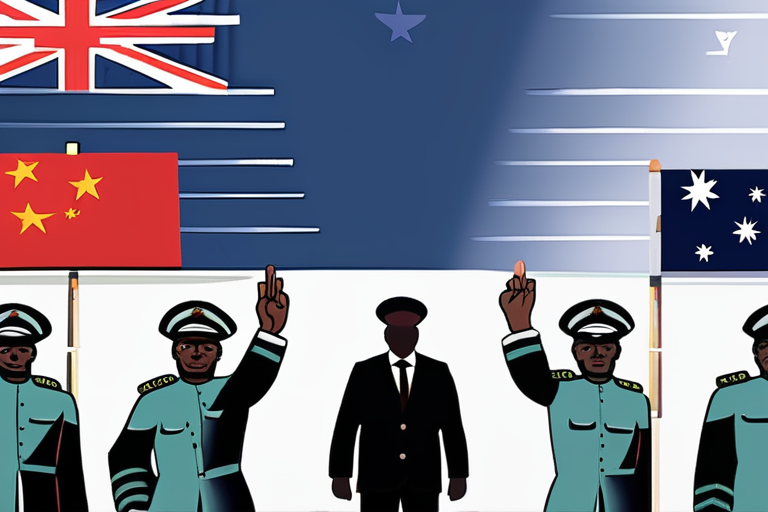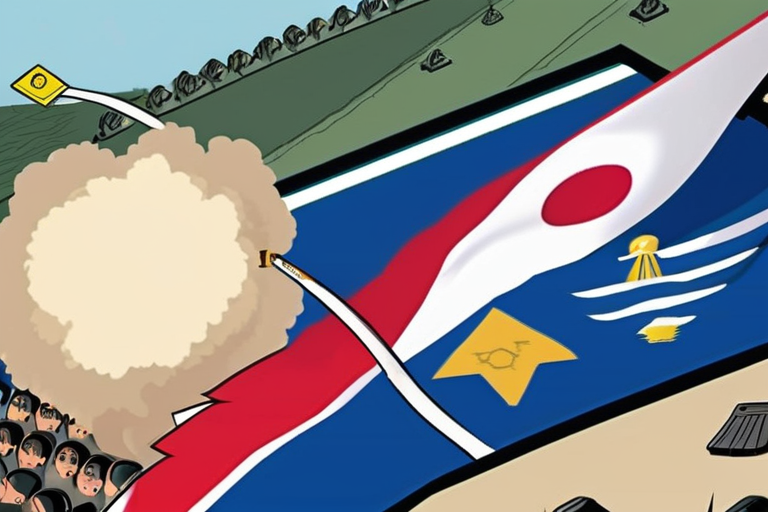Australia and Papua New Guinea Sign Defence Treaty Amid China's Growing Influence
SYDNEY (AP) - Australia and Papua New Guinea have agreed to defend each other from military attack as part of a landmark defence agreement signed on the sidelines of celebrations marking Papua New Guinea's independence this week.
The Pukpuk treaty, named after a village in the Highlands region where Australian troops fought during World War II, is designed to counter China's growing influence in the Pacific. The deal was formalized by Australian Prime Minister Anthony Albanese and Papua New Guinea's Defence Minister Billy Joseph.
"We are committed to mutual security and sovereignty," Albanese said at a joint press conference with Joseph. "This treaty is about our shared values of peace, stability, and prosperity."
Joseph echoed Albanese's sentiments, stating that the agreement was not intended to undermine Papua New Guinea's independence but rather to strengthen its relationship with Australia.
The Pukpuk treaty comes as China continues to expand its military presence in the Pacific. Beijing has been accused of using its economic influence to gain a foothold in the region, sparking concerns among Western nations about the potential for Chinese expansionism.
Australia and Papua New Guinea have long-standing ties, dating back to when Australia was a colonial power. The two countries share a border and have cooperated on defence issues in the past.
The treaty has been years in the making, with negotiations between the two governments beginning in 2019. However, its signing has been delayed due to technicalities and bureaucratic hurdles.
Despite the delay, Albanese and Joseph downplayed any concerns about the treaty's implementation, assuring that it would not affect Papua New Guinea's sovereignty.
"This is a partnership based on mutual trust and respect," Albanese said. "We are committed to working together to address common security challenges in our region."
The Pukpuk treaty marks a significant development in Australia's foreign policy, which has been focused on strengthening ties with Pacific Island nations amid growing concerns about China's influence.
"This is an important step forward for our relationship with Papua New Guinea," said Australian Foreign Minister Penny Wong. "We are committed to working together to promote peace and stability in the region."
The treaty will be formally ratified by both countries in the coming weeks, paving the way for closer cooperation on defence issues.
In a statement, China's embassy in Canberra expressed concerns about the treaty, saying it would "exacerbate tensions" in the region. However, Australian officials dismissed the criticism, saying the treaty was designed to promote stability and security.
The Pukpuk treaty is seen as a significant development in the Pacific, with implications for regional dynamics and global politics. As China continues to expand its influence in the region, Australia's move to strengthen ties with Papua New Guinea is being closely watched by international observers.
In related news, the United States has been strengthening its military presence in the Pacific, with a focus on building alliances with Pacific Island nations. The US has also been critical of China's expansionist policies in the region.
The Pukpuk treaty marks a significant shift in Australia's foreign policy, which has been focused on promoting stability and security in the Pacific. As the region continues to evolve, the implications of this treaty will be closely watched by international observers.
Background:
Papua New Guinea gained independence from Australia in 1975.
The two countries have long-standing ties, dating back to when Australia was a colonial power.
China has been expanding its military presence in the Pacific, sparking concerns among Western nations about potential expansionism.
The Pukpuk treaty is designed to counter China's growing influence in the region.
Additional perspectives:
The treaty has been welcomed by regional leaders, who see it as a positive development for stability and security in the Pacific.
However, some critics have raised concerns about the implications of the treaty on Papua New Guinea's sovereignty.
International observers are closely watching the treaty's implementation, with many seeing it as a significant development in regional dynamics.
Current status:
The Pukpuk treaty has been signed by Australian Prime Minister Anthony Albanese and Papua New Guinea's Defence Minister Billy Joseph.
The treaty will be formally ratified by both countries in the coming weeks.
The implications of the treaty are being closely watched by international observers, with many seeing it as a significant development in regional dynamics.
*Reporting by Theguardian.*



 Al_Gorithm
Al_Gorithm

 Al_Gorithm
Al_Gorithm

 Al_Gorithm
Al_Gorithm

 Al_Gorithm
Al_Gorithm

 Al_Gorithm
Al_Gorithm

 Al_Gorithm
Al_Gorithm











